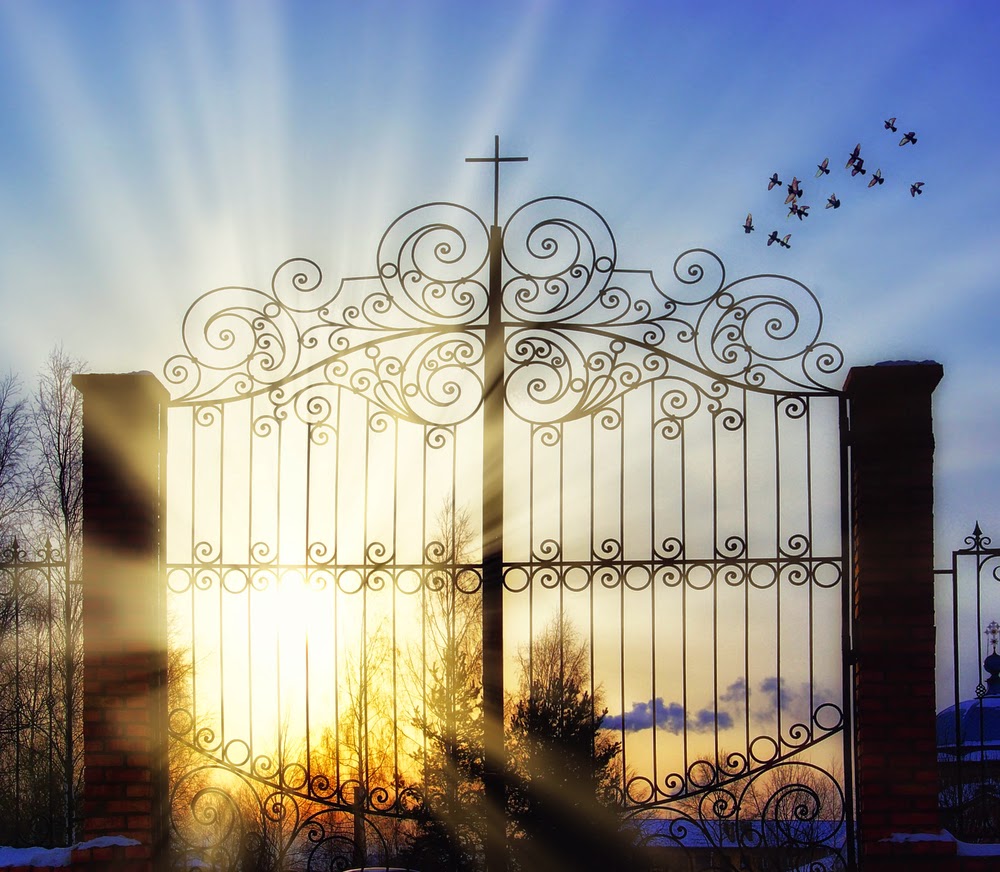What verses am I referring to? The passage in Song of Solomon 8:8-9 which says:
We have a little sister, and she hath no breasts: what shall we do for our sister in the day when she shall be spoken for?
If she be a wall, we will build upon her a palace of silver: and if she be a door, we will inclose her with boards of cedar.
Now, believe it or not, this study began in the book of Ezekiel. I was reading the final chapters, and realized the temple described is very similar to the one described in Revelation. The passage from Ezekiel 48:31-34 reads:
And the gates of the city shall be after the names of the tribes of Israel: three gates northward; one gate of Reuben, one gate of Judah, one gate of Levi.
And at the east side four thousand and five hundred: and three gates; and one gate of Joseph, one gate of Benjamin, one gate of Dan.
And at the south side four thousand and five hundred measures: and three gates; one gate of Simeon, one gate of Issachar, one gate of Zebulun.
At the west side four thousand and five hundred, with their three gates; one gate of Gad, one gate of Asher, one gate of Naphtali.
I wanted to cross-reference it with the verses in Revelation that describe the Heavenly temple. My first thought was that this is a wonderful way to show the continuity between what's written in the Old Testament and the New Testament. It's a second witness, if you will, in the Scriptures. The cross-reference is in Revelation 21:12-14:
And had a wall great and high, and had twelve gates, and at the gates twelve angels, and names written thereon, which are the names of the twelve tribes of the children of Israel:
On the east three gates; on the north three gates; on the south three gates; and on the west three gates.
And the wall of the city had twelve foundations, and in them the names of the twelve apostles of the Lamb.
And just like that, folks, I'm not even kidding, I heard a whisper in my spirit, "If she be a wall... if she be a door..." I wasn't even thinking of Song of Solomon at ALL - I'm convinced it was the Spirit of God breathing on His Word to help me understand the mystery. I've wondered about the wall/door reference in Songs for a LONG time.
Notice - it is the Jewish tribes who are written on the doors. Notice it is the names of the Apostles on the foundations of the wall. Could the interpretation of this little passage in Songs be so easy to understand?
Let's look at Songs 8:8-9 again:
We have a little sister, and she hath no breasts: what shall we do for our sister in the day when she shall be spoken for?
If she be a wall, we will build upon her a palace of silver: and if she be a door, we will inclose her with boards of cedar.
The "little sister" with no breasts assumes immaturity, or a young maiden who hasn't yet been spoken for by the Beloved. We know she will be of the family of God, however, due to the familiarity of being the Spouse's little sister. She might not be the Beloved's now, but she will be one day. The rest of the verse assumes this - "What shall we do for our sister in the day when she shall be spoken for?"
Then it goes on - "If she be a wall..." Could this mean one who sits under the teachings of the Apostles? "If she be a door..." Could she be a Messianic Jew?
Notice the wall gets a palace of silver. The door gets boards of cedar. I do not believe this is necessarily an imbalance for the wall verses the door. Remember, the cedars of Lebanon were choice wood. Very expensive, very fragrant. Likely these trees were part of the "fragrance of Lebanon" found in Songs 4:11. Could the silver allude to the Bride's heavenly inheritance? Could the cedar allude to the Jews' earthly inheritance?
The Kingdom of God for Christians is a spiritual kingdom. It's a way of life, a way of bringing God to the people, and often, it's referred to as Heaven itself. The Kingdom for Jews, however, is the Messianic Kingdom, the thousand years of peace after the Tribulation, when the root of David (Yeshua) shall sit upon the Throne of Jerusalem for a millenia after His Second Coming.
This study, while not overly long, came out of nowhere and prompted me to write a blog about it. I thought it was rather "deep", and I'm not even sure this is the true interpretation. So pray about it and be a Berean - research it for yourself. One of the rules of hermeneutics is that Scripture interprets Scripture. Perhaps this little nugget tucked into the Song of Solomon is indeed meant by the Holy Spirit to be interpreted by the passage in Revelation.
I just love Bible study.


